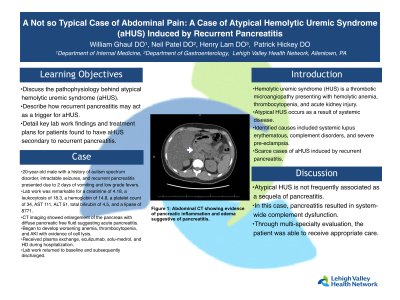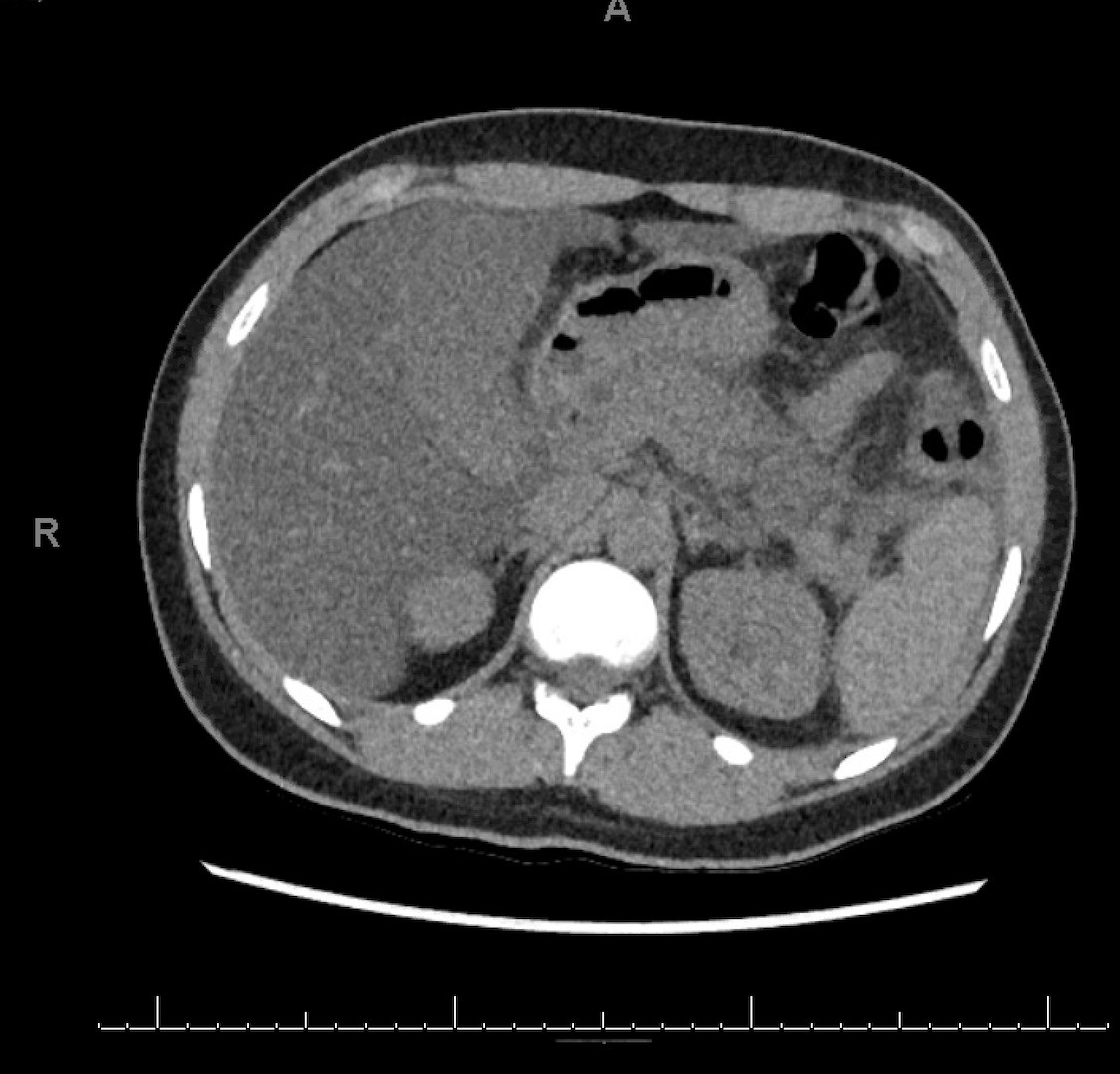Back


Poster Session A - Sunday Afternoon
Category: Biliary/Pancreas
A0033 - A Not So Typical Case of Abdominal Pain: A Case of Atypical Hemolytic Uremic Syndrome (aHUS) Induced by Recurrent Pancreatitis
Sunday, October 23, 2022
5:00 PM – 7:00 PM ET
Location: Crown Ballroom

Has Audio
- WG
William Ghaul, DO
Lehigh Valley Health Network
Allentown, PA
Presenting Author(s)
William Ghaul, DO, Neil Patel, DO, Henry Lam, DO
Lehigh Valley Health Network, Allentown, PA
Introduction: Hemolytic uremic syndrome (HUS) is a thrombotic microangiopathy presenting with hemolytic anemia, thrombocytopenia, and kidney injury. Although typically caused by E. coli infection, atypical HUS (aHUS) occurs as a result of systemic disease. Causes include systemic lupus erythematous, complement disorders, and pre-eclampsia. Rare cases exist of aHUS induced by recurrent pancreatitis. In these situations, the cause of pancreatitis was alcohol-induced. We present a case of aHUS induced by non-alcoholic pancreatitis.
Case Description/Methods: The patient is a 20-year-old male with a history of autism spectrum disorder, seizures, and recurrent pancreatitis who presented due to 2 days of vomiting, fevers, and abdominal pain. He had acute pancreatitis 2 years prior, which was thought to be medication-induced. Lab work was remarkable for a creatinine of 4.18, a leukocytosis of 18.3, a hemoglobin of 14.8, a platelet count of 34, AST 111, ALT 51, total bilirubin of 4.5, and a lipase of 8771. CT imaging showed enlargement of the pancreas with diffuse pancreatic free fluid suggesting pancreatitis. He was admitted to the ICU. Acutely overnight the patient’s hemoglobin decreased from 14.8 to 10.9, platelets to 9, and creatinine to 5.32. No signs of active bleed. Haptoglobin was decreased at 8. Indirect bilirubin and LDH were elevated. His hemoglobin and platelets continued to decrease, while his renal function worsened. DIC panel and Coombs test negative. His CH50 was decreased at 50. ADAMTS13 was 96%. The patient received two sessions of plasma exchange therapy. The leading differential diagnosis at the time was atypical HUS secondary to recurrent pancreatitis. On day 4, the patient received eculizumab and was started on a course of solumedrol. On day 5, the patient underwent hemodialysis. The patient’s anemia and thrombocytopenia improved. His renal function returned to his baseline. He was subsequently transferred to the floors for continued management.
Discussion: Atypical HUS is not frequently associated as a sequela of pancreatitis. Most commonly associated are pseudocyst formation and biliary tree dilation. However, in this case, pancreatitis resulted in system-wide complement dysfunction. Through multi-specialty evaluation, the patient was able to receive appropriate care. Eculizumab has been shown to inhibit the thrombotic microangiopathy. As his pancreatitis improved with supportive care, the patient’s consequences of this initial insult required much closer management.

Disclosures:
William Ghaul, DO, Neil Patel, DO, Henry Lam, DO. A0033 - A Not So Typical Case of Abdominal Pain: A Case of Atypical Hemolytic Uremic Syndrome (aHUS) Induced by Recurrent Pancreatitis, ACG 2022 Annual Scientific Meeting Abstracts. Charlotte, NC: American College of Gastroenterology.
Lehigh Valley Health Network, Allentown, PA
Introduction: Hemolytic uremic syndrome (HUS) is a thrombotic microangiopathy presenting with hemolytic anemia, thrombocytopenia, and kidney injury. Although typically caused by E. coli infection, atypical HUS (aHUS) occurs as a result of systemic disease. Causes include systemic lupus erythematous, complement disorders, and pre-eclampsia. Rare cases exist of aHUS induced by recurrent pancreatitis. In these situations, the cause of pancreatitis was alcohol-induced. We present a case of aHUS induced by non-alcoholic pancreatitis.
Case Description/Methods: The patient is a 20-year-old male with a history of autism spectrum disorder, seizures, and recurrent pancreatitis who presented due to 2 days of vomiting, fevers, and abdominal pain. He had acute pancreatitis 2 years prior, which was thought to be medication-induced. Lab work was remarkable for a creatinine of 4.18, a leukocytosis of 18.3, a hemoglobin of 14.8, a platelet count of 34, AST 111, ALT 51, total bilirubin of 4.5, and a lipase of 8771. CT imaging showed enlargement of the pancreas with diffuse pancreatic free fluid suggesting pancreatitis. He was admitted to the ICU. Acutely overnight the patient’s hemoglobin decreased from 14.8 to 10.9, platelets to 9, and creatinine to 5.32. No signs of active bleed. Haptoglobin was decreased at 8. Indirect bilirubin and LDH were elevated. His hemoglobin and platelets continued to decrease, while his renal function worsened. DIC panel and Coombs test negative. His CH50 was decreased at 50. ADAMTS13 was 96%. The patient received two sessions of plasma exchange therapy. The leading differential diagnosis at the time was atypical HUS secondary to recurrent pancreatitis. On day 4, the patient received eculizumab and was started on a course of solumedrol. On day 5, the patient underwent hemodialysis. The patient’s anemia and thrombocytopenia improved. His renal function returned to his baseline. He was subsequently transferred to the floors for continued management.
Discussion: Atypical HUS is not frequently associated as a sequela of pancreatitis. Most commonly associated are pseudocyst formation and biliary tree dilation. However, in this case, pancreatitis resulted in system-wide complement dysfunction. Through multi-specialty evaluation, the patient was able to receive appropriate care. Eculizumab has been shown to inhibit the thrombotic microangiopathy. As his pancreatitis improved with supportive care, the patient’s consequences of this initial insult required much closer management.

Figure: Inflammation of the pancreas seen on CT imaging.
Disclosures:
William Ghaul indicated no relevant financial relationships.
Neil Patel indicated no relevant financial relationships.
Henry Lam indicated no relevant financial relationships.
William Ghaul, DO, Neil Patel, DO, Henry Lam, DO. A0033 - A Not So Typical Case of Abdominal Pain: A Case of Atypical Hemolytic Uremic Syndrome (aHUS) Induced by Recurrent Pancreatitis, ACG 2022 Annual Scientific Meeting Abstracts. Charlotte, NC: American College of Gastroenterology.
